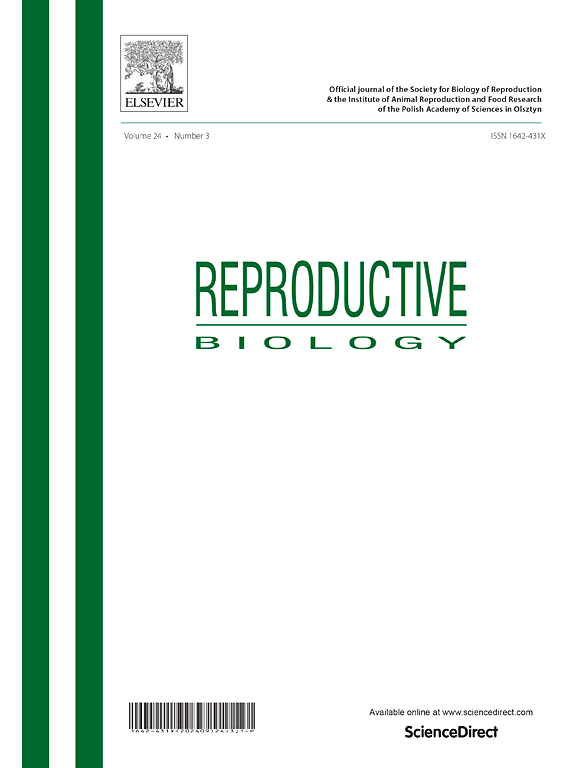Fisetin attenuates the adverse effects of freezing and thawing procedures on the biological characteristics of human asthenoteratozoospermia samples
IF 2.5
3区 生物学
Q3 REPRODUCTIVE BIOLOGY
引用次数: 0
Abstract
Sperm cryopreservation is a conventional method to preserve sperm cells for a long time. This technique may cause various effects on sperm parameters. Therefore, applying beneficial antioxidants to decrease the adverse effects of freezing is noteworthy. Fisetin is a compound with antioxidant and anti-inflammatory properties. The main aim of the present study is to investigate the protective and beneficial effects of fisetin against cryo-damage on sperm functional parameters. In this experimental study, we analyzed 20 semen samples from asthenoteratozoospermic (AT) patients. Each sample was divided into three treatment groups: (1) fresh control (non-frozen), (2) cryopreservation medium (without fisetin), and (3) cryomedium supplemented with 50 μM fisetin. Freezing and thawing procedures were performed via the conventional method. Post-thaw analyses revealed that cryopreservation significantly reduced sperm motility, chromatin integrity, and mitochondrial membrane potential while increasing DNA fragmentation, malondialdehyde (MDA) levels, and apoptosis (p < 0.05). Fisetin supplementation markedly improved progressive motility (p < 0.05), reduced non-motile sperm percentage (p < 0.05), and decreased DNA fragmentation and MDA levels (p < 0.05). Additionally, it enhanced chromatin condensation and reduced apoptosis rates (p < 0.05). Fisetin attenuates cryo-damage through its antioxidant and anti-apoptotic properties, improving post-thaw sperm quality. Thus, incorporating fisetin into cryopreservation media could enhance sperm viability for assisted reproductive technologies (ART).
非瑟酮可减轻冷冻和解冻过程对人类弱异精子症样本生物学特性的不利影响
精子低温保存是一种长期保存精子细胞的传统方法。这项技术可能会对精子参数产生各种影响。因此,应用有益的抗氧化剂来减少冷冻的不利影响是值得注意的。非瑟酮是一种具有抗氧化和抗炎特性的化合物。本研究的主要目的是探讨非瑟酮对精子功能参数的保护和有益作用。在本实验研究中,我们分析了20例无畸形精子症(AT)患者的精液样本。每个样品分为三个处理组:(1)新鲜对照(不冷冻),(2)低温保存培养基(不含非瑟酮),(3)添加50 μM非瑟酮的低温培养基。冷冻和解冻程序通过常规方法进行。解冻后分析显示,冷冻保存显著降低了精子活力、染色质完整性和线粒体膜电位,同时增加了DNA断裂、丙二醛(MDA)水平和细胞凋亡(p <; 0.05)。补充非瑟酮可显著提高进行性运动能力(p <; 0.05),降低非运动精子百分比(p <; 0.05),降低DNA片段化和MDA水平(p <; 0.05)。此外,它还能增强染色质凝聚,降低细胞凋亡率(p <; 0.05)。非瑟酮通过其抗氧化和抗凋亡特性减轻低温损伤,改善解冻后精子质量。因此,在低温保存培养基中加入非瑟酮可以提高辅助生殖技术(ART)的精子存活率。
本文章由计算机程序翻译,如有差异,请以英文原文为准。
求助全文
约1分钟内获得全文
求助全文
来源期刊

Reproductive biology
生物-生殖生物学
CiteScore
3.90
自引率
0.00%
发文量
95
审稿时长
29 days
期刊介绍:
An official journal of the Society for Biology of Reproduction and the Institute of Animal Reproduction and Food Research of Polish Academy of Sciences in Olsztyn, Poland.
Reproductive Biology is an international, peer-reviewed journal covering all aspects of reproduction in vertebrates. The journal invites original research papers, short communications, review articles and commentaries dealing with reproductive physiology, endocrinology, immunology, molecular and cellular biology, receptor studies, animal breeding as well as andrology, embryology, infertility, assisted reproduction and contraception. Papers from both basic and clinical research will be considered.
 求助内容:
求助内容: 应助结果提醒方式:
应助结果提醒方式:


